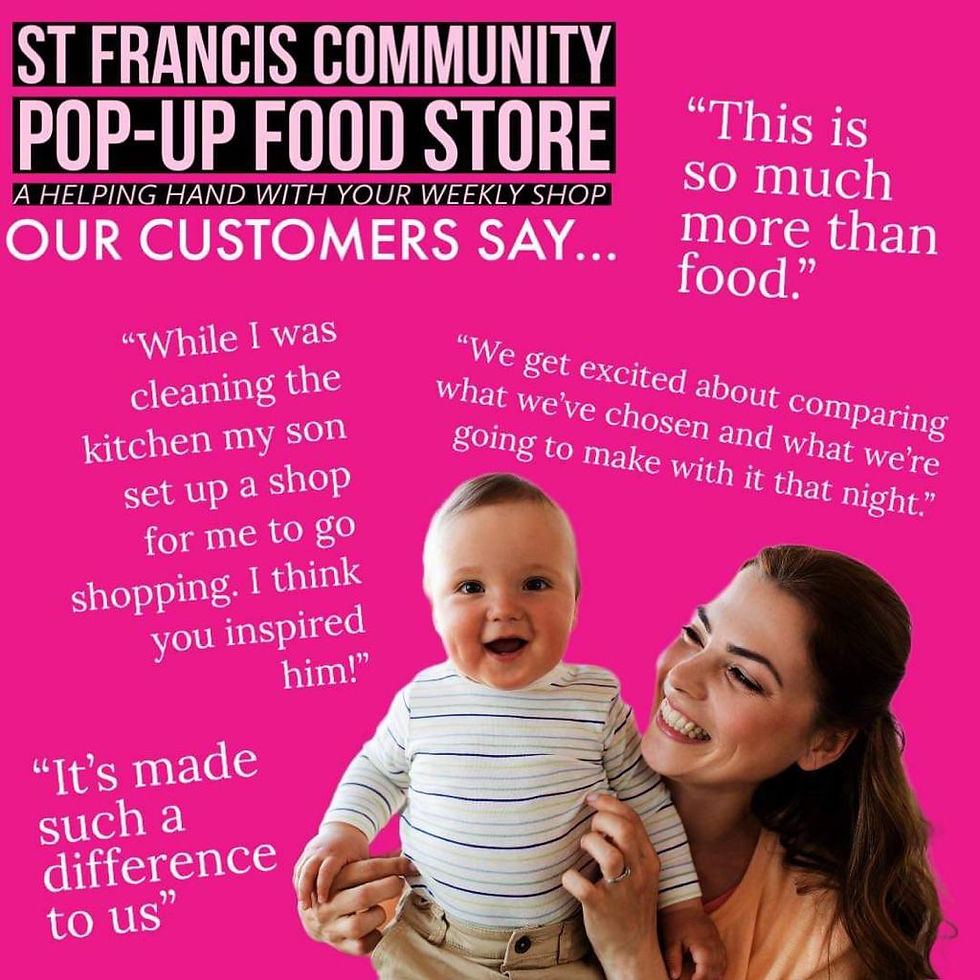Poverty proofing and pop-up pantries.
- hello827251
- Sep 17, 2025
- 4 min read
As harvest approaches and the children are back at school, it’s a time when we think about the food we eat; the places it comes from and the impact of hunger at home and abroad. Harvest, food banks and pop-up shops are closely linked through community collections during the autumn Harvest Festival season. This is an opportunity for communities to come together and provide essential non-perishable food supplies to help food banks meet the ever-rising demand and support people facing food poverty. Schools, churches, businesses, and individuals donate food, which volunteers sort, pack and distribution to people with the goal to ensure that communities can support those in need.

“Poverty scars the lives and life chances of children. It is shameful that child poverty has increased by 700,000 since 2010, with over four million children now living in poverty in the UK and 800,000 children using foodbanks to eat.” (DFE)
Let’s also remember that not only are children living in poverty there are children and families living in ‘deep poverty’ – this is a situation more severe than poverty itself. In the UK, ‘deep poverty’ is typically defined by income, meaning a household's disposable income is less than 50% of the national median income after housing costs are deducted, while very deep poverty is less than 40%.
Poverty means lacking sufficient money for basic needs. Families in poverty may not afford the same food, housing, or activities as others in society.
Poverty impacts every part of a child’s life, resulting in inadequate housing, lack of essentials, and limited opportunities. It severely affects children’s health, wellbeing, education, and future prospects. (https://cpag.org.uk)
Children in poverty face significant challenges at school, including hunger, fatigue, and poor mental, physical, and dental health, according to the Joseph Rowntree Foundation. They are more likely to miss school, live in inadequate conditions, and have fewer opportunities and resources for learning and extracurricular activities.)
Let us examine certain facts—facts that, for a developed nation, remain unacceptable.
In the UK, 4.5 million children—about 9 per classroom—live in poverty. This includes many working families; in fact, 70% of children in poverty have at least one working parent. Children in single-parent families (43%) and those with a disabled family member (44%) are particularly at risk. While figures differ by region, rising poverty is clearly impacting children's learning, social interactions, self-esteem, and overall family opportunities. Children and young people are aware, to some degree, depending on age and life experiences of the depth of poverty they live in and its relativity to their more affluent peers.
In the last few years, the number of families accessing help from food banks has dramatically increased. The Trussell Trust reports that they have seen a rise from approximately 60,000 emergency food parcels distributed in the year 2010/11 year to nearly 3 million parcels in 2024/25. This has risen 51% in the last 5 years since covid and over 1 million of the parcels are delivered to children.
This harvest time, Tickhub are supporting the St Francis’ Community churches ‘Pop up supermarket’ and through research undertaken ahead of our upcoming book we are reflecting more deeply on the impact that poverty and ‘deep/ absolute poverty’ has on our children and our wider community.
We met with Ruth Pearce, community Organiser, at St Francis Community Church in Chelmsford who was instrumental in setting up the pop-up supermarket to support families with the cost of weekly shopping. Ruth explained that before launching the pop-up food store she worked closely with the Chelmsford Food Alliance and Essex County Council to research the best locations.

“We found people living more rurally spend more money on transport to access food, impacting on already tight budgets. It became clear there was a need for a mobile pop-up store that can travel close to where people live, rather than restricted to one central location.”
The pop-up supermarket is now Chelmsford’s first (and only) mobile social supermarket offering affordable food to those who are being forced to face the reality of food poverty. They aim to provide ‘a helping hand with your weekly shop’; alleviating the pressure of the grocery bill with dignity through choice. They ‘Pop Up’ in two separate locations each week so people in those communities can access their provision. Alongside the shopping there is an opportunity to sit with tea/coffee and biscuits to chat with friends, old and new. The hope is that in time these 'pop-up food stores' will not only help financially but also create a sense of community as isolation often goes hand in hand with all kinds of poverty.
As Maslow’s Hierarchy of Needs demonstrates – if basic needs are not met then it is nearly impossible for a human to thrive as they are focusing on their basic instinct to survive.
As a teacher, it is not always easy to identify those children who are living in poverty – the signs are not also bold and clear. So, as we approach harvest -a time when we are reflective and thankful for the food we have - it is more important than ever to think about how we can support those in our communities who are struggling with poverty – no child (or adult) should ever have to go without their basic needs being met.
If any aspects of this blog have caused you concern please see below for support networks:
The Children’s Trust - https://www.childhoodtrust.org.uk/
Barnardo’s - https://www.barnardos.org.uk/get-involved/campaign-with-us/child-poverty/get-support
Family Action - https://family-action.org.uk/
Benefits and financial support for families - https://www.gov.uk/browse/benefits/families
Family Action Grants to support families and children - https://family-action.org.uk/grant-programmes/
Grants for Kids - https://cashforkids.org.uk/grants/
Gingerbread – grands for single parents - https://www.gingerbread.org.uk/find-information/money/grants/
Home Start Essex - https://home-startessex.org.uk








Comments